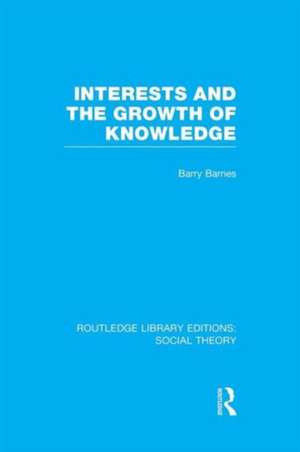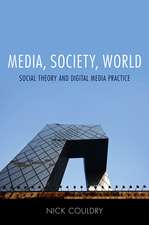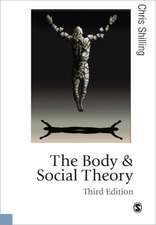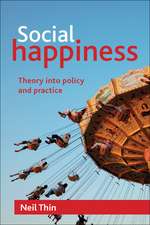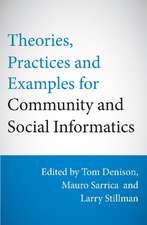Interests and the Growth of Knowledge (RLE Social Theory): Routledge Library Editions: Social Theory
Autor Barry Barnesen Limba Engleză Paperback – 21 dec 2015
Barry Barnes takes the classic writings in the sociology of knowledge – by Marx, Lukács, Weber, Mannheim, Goldmann, Habermas and others – and uses them as resources in coming to grips with what he regards as the currently most interesting and significant questions in this area. This approach reflects one of the principal themes of the book itself. Knowledge, it is argued, is best treated as a resource available to those possessing it. This is the best perspective from which to understand its relationship to action and its historical significance; it is a perspective which avoids the problems of holding that knowledge is derivative, as well as those generated by the view that knowledge is a strong determinant of consciousness. the result is an unusual textbook, particularly valuable when read in conjunction with the original works it discusses.
| Toate formatele și edițiile | Preț | Express |
|---|---|---|
| Paperback (1) | 436.14 lei 6-8 săpt. | |
| Taylor & Francis – 21 dec 2015 | 436.14 lei 6-8 săpt. | |
| Hardback (1) | 776.92 lei 6-8 săpt. | |
| Taylor & Francis – 8 aug 2014 | 776.92 lei 6-8 săpt. |
Din seria Routledge Library Editions: Social Theory
-
 Preț: 296.35 lei
Preț: 296.35 lei -
 Preț: 356.64 lei
Preț: 356.64 lei - 55%
 Preț: 658.96 lei
Preț: 658.96 lei - 37%
 Preț: 623.83 lei
Preț: 623.83 lei - 38%
 Preț: 764.20 lei
Preț: 764.20 lei - 34%
 Preț: 652.62 lei
Preț: 652.62 lei - 15%
 Preț: 611.89 lei
Preț: 611.89 lei - 38%
 Preț: 765.01 lei
Preț: 765.01 lei - 18%
 Preț: 847.16 lei
Preț: 847.16 lei - 37%
 Preț: 624.60 lei
Preț: 624.60 lei - 36%
 Preț: 822.36 lei
Preț: 822.36 lei - 36%
 Preț: 850.99 lei
Preț: 850.99 lei - 39%
 Preț: 679.92 lei
Preț: 679.92 lei - 39%
 Preț: 678.28 lei
Preț: 678.28 lei - 38%
 Preț: 765.43 lei
Preț: 765.43 lei - 15%
 Preț: 555.94 lei
Preț: 555.94 lei - 36%
 Preț: 499.40 lei
Preț: 499.40 lei - 37%
 Preț: 624.60 lei
Preț: 624.60 lei - 39%
 Preț: 680.31 lei
Preț: 680.31 lei - 38%
 Preț: 765.03 lei
Preț: 765.03 lei - 25%
 Preț: 311.93 lei
Preț: 311.93 lei - 37%
 Preț: 624.60 lei
Preț: 624.60 lei - 18%
 Preț: 888.99 lei
Preț: 888.99 lei - 37%
 Preț: 624.21 lei
Preț: 624.21 lei - 18%
 Preț: 1005.80 lei
Preț: 1005.80 lei - 38%
 Preț: 765.84 lei
Preț: 765.84 lei - 36%
 Preț: 823.99 lei
Preț: 823.99 lei -
 Preț: 330.87 lei
Preț: 330.87 lei - 34%
 Preț: 622.99 lei
Preț: 622.99 lei - 18%
 Preț: 1060.25 lei
Preț: 1060.25 lei - 39%
 Preț: 678.69 lei
Preț: 678.69 lei - 18%
 Preț: 886.63 lei
Preț: 886.63 lei - 39%
 Preț: 678.30 lei
Preț: 678.30 lei - 37%
 Preț: 623.81 lei
Preț: 623.81 lei - 39%
 Preț: 682.65 lei
Preț: 682.65 lei - 34%
 Preț: 454.97 lei
Preț: 454.97 lei - 38%
 Preț: 765.45 lei
Preț: 765.45 lei - 28%
 Preț: 277.11 lei
Preț: 277.11 lei - 34%
 Preț: 763.78 lei
Preț: 763.78 lei - 35%
 Preț: 554.64 lei
Preț: 554.64 lei - 39%
 Preț: 680.73 lei
Preț: 680.73 lei - 38%
 Preț: 764.62 lei
Preț: 764.62 lei - 36%
 Preț: 991.80 lei
Preț: 991.80 lei - 38%
 Preț: 763.78 lei
Preț: 763.78 lei - 37%
 Preț: 622.60 lei
Preț: 622.60 lei - 38%
 Preț: 764.62 lei
Preț: 764.62 lei - 18%
 Preț: 1059.45 lei
Preț: 1059.45 lei - 18%
 Preț: 1000.27 lei
Preț: 1000.27 lei
Preț: 436.14 lei
Nou
Puncte Express: 654
Preț estimativ în valută:
83.48€ • 90.71$ • 70.17£
83.48€ • 90.71$ • 70.17£
Carte tipărită la comandă
Livrare economică 21 aprilie-05 mai
Preluare comenzi: 021 569.72.76
Specificații
ISBN-13: 9781138972964
ISBN-10: 1138972967
Pagini: 128
Dimensiuni: 156 x 234 x 7 mm
Greutate: 0.45 kg
Ediția:1
Editura: Taylor & Francis
Colecția Routledge
Seria Routledge Library Editions: Social Theory
Locul publicării:Oxford, United Kingdom
ISBN-10: 1138972967
Pagini: 128
Dimensiuni: 156 x 234 x 7 mm
Greutate: 0.45 kg
Ediția:1
Editura: Taylor & Francis
Colecția Routledge
Seria Routledge Library Editions: Social Theory
Locul publicării:Oxford, United Kingdom
Cuprins
1. The Problem of Knowledge 2. The Problem of Ideology 3. The Problem of Imputation 4. The Problem of the Power of Knowledge and Ideas
Descriere
Intriguingly different in approach from conventional works in the same area of inquiry, this study deals with the central problems and concerns of the sociology of knowledge as it has traditionally been conceived of. In other words, it is concerned with the relationship of knowledge, social interests and social structure, and with the various attempts which have been made to analyse the relationship.
Barry Barnes takes the classic writings in the sociology of knowledge – by Marx, Lukács, Weber, Mannheim, Goldmann, Habermas and others – and uses them as resources in coming to grips with what he regards as the currently most interesting and significant questions in this area. This approach reflects one of the principal themes of the book itself. Knowledge, it is argued, is best treated as a resource available to those possessing it. This is the best perspective from which to understand its relationship to action and its historical significance; it is a perspective which avoids the problems of holding that knowledge is derivative, as well as those generated by the view that knowledge is a strong determinant of consciousness. the result is an unusual textbook, particularly valuable when read in conjunction with the original works it discusses.
Barry Barnes takes the classic writings in the sociology of knowledge – by Marx, Lukács, Weber, Mannheim, Goldmann, Habermas and others – and uses them as resources in coming to grips with what he regards as the currently most interesting and significant questions in this area. This approach reflects one of the principal themes of the book itself. Knowledge, it is argued, is best treated as a resource available to those possessing it. This is the best perspective from which to understand its relationship to action and its historical significance; it is a perspective which avoids the problems of holding that knowledge is derivative, as well as those generated by the view that knowledge is a strong determinant of consciousness. the result is an unusual textbook, particularly valuable when read in conjunction with the original works it discusses.
Notă biografică
Thomas Lemke is Heisenberg Professor of Sociology with a focus on biotechnologies, nature, and society at Goethe University–Frankfurt/Main in Germany. His research interests include social and political theory, biopolitics, and social studies of genetic and reproductive technologies. His recent publications include Der medizinische Blick in die Zukunft: Gesellschaftliche Implikationen prädiktiver Gentests (co-authored with Regine Kollek) (Campus 2008); Governmentality: Current Issues and Future Challenges (co-edited with Ulrich Bröckling and Susanne Krasmann) (Routledge 2010); biopolitics: An Advanced Introduction (New York University Press 2011). You can email him at lemke@em.uni-frankfurt.de.
